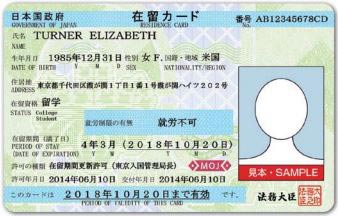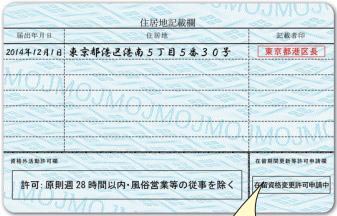Moving to Japan and setting yourself up can be a frustrating process. The protocol for registration and rules around setting up a bank account are particularly rigid and require everything be done in order—and so knowing a little about how the system works can save you hours if not days of time.
Registration with the Authorities
If you intend to stay in Japan for more than 3 months (and have the required visa) you will need to carry a Residence Card (在留カード, zairyū-kādo) with you during your stay in the country. Like a driving license, this is just a credit card-sized ID that shows your name, date of birth, visa status and so forth.
Assuming you enter the country through one of the main airports this will be issued to you at immigration; otherwise, a temporary seal will be put in your passport and you will need to go to the municipal offices in the municipality where you will stay within 14 days of landing.
The most important step is to have your address in Japan registered on the back of the residence card at the municipal offices. Officially, you are required to visit the municipal offices to register your address “within 14 days of finding a place to settle down”. For those that do not have accommodation lined up in advance this can seem counter-intuitive since no landlord is going to lease you an apartment unless you have a registered address.
In fact, when registering your address at the municipal offices there are no checks to ensure that you are living at the place to say you are. You can register any type of residence: hotel, hostel, or a friend’s place. Once registered, the little red stamp on the back of the residence card is your key to everything from getting a phone contract to signing an apartment lease.
Bank Account
You may be told upon walking into a branch and attempting to open an account that you need to have been in the country for six months to be eligible. This not true—and if you can prove that you require a bank account to live in Japan (for example, you have a work contract with a salary date or a school registration certificate) they will waive this condition.
Even at the main branches of the mega-banks it might be difficult conveying such things in English so bringing along a Japanese-speaking friend is advisable.
To open a bank account you will need:
- Your passport
- Your residence card (with a registered address on the back)
You may also be asked to make an inkan or hanko. This is a seal that has characters (your name) carved into the bottom and is used as a form of signature for official documentation in Japan. Seals can be purchased for as little as ¥2,000 and you can specify your own design. As a foreigner, however, you are not expected to have a seal and so can use your hand-signature instead (arguably preferable because it means one less thing to remember when you visit a bank branch).
You will need a bank card (not just a bank account number) to sign an apartment lease and get a mobile phone. Issuance of debit cards take 2-3 weeks, but if that’s too long you can request a cash card instead (a card that you can only use to withdraw money at ATMs). Cash cards usually arrive within 7-10 days.
If the place you’re staying does not have your name on the front you should tell the bank to add your friend’s name in “C/O” to the envelope to avoid a failed delivery, the card being returned and destroyed, and finding yourself back at square one. The card will only be dispatched to your official residence (i.e. the address on the back of your residence card) and so this should be a place at which you will be staying for more than just a couple of nights (for this reason registering at a friend’s address is preferable to a hotel or hostel).
Mobile Phone
Armed with your residence card and bank card you are now able to get a mobile phone. To rent an apartment you will need a contact phone number so this should be your next priority. It used to be the case that all phone contracts were two years but monthly contracts are now widely available through Docomo and other providers.





